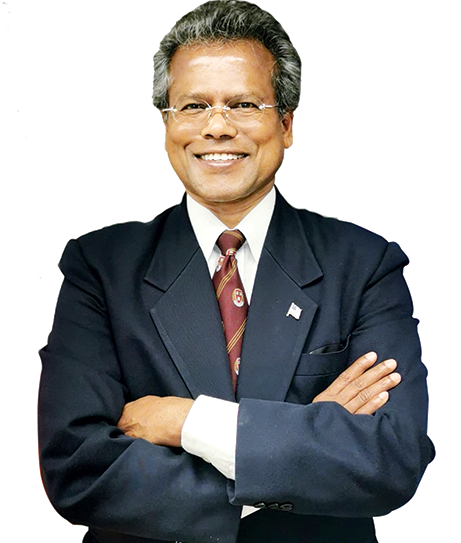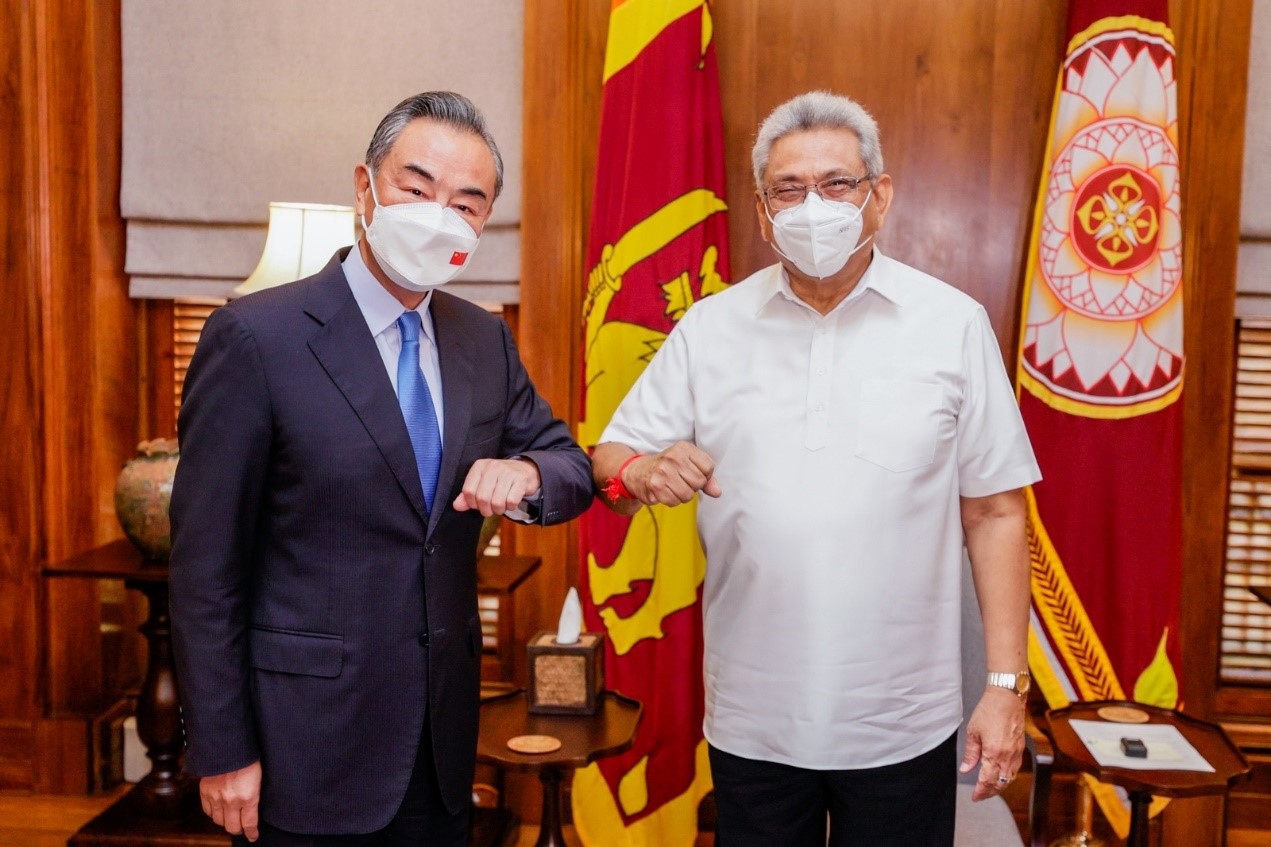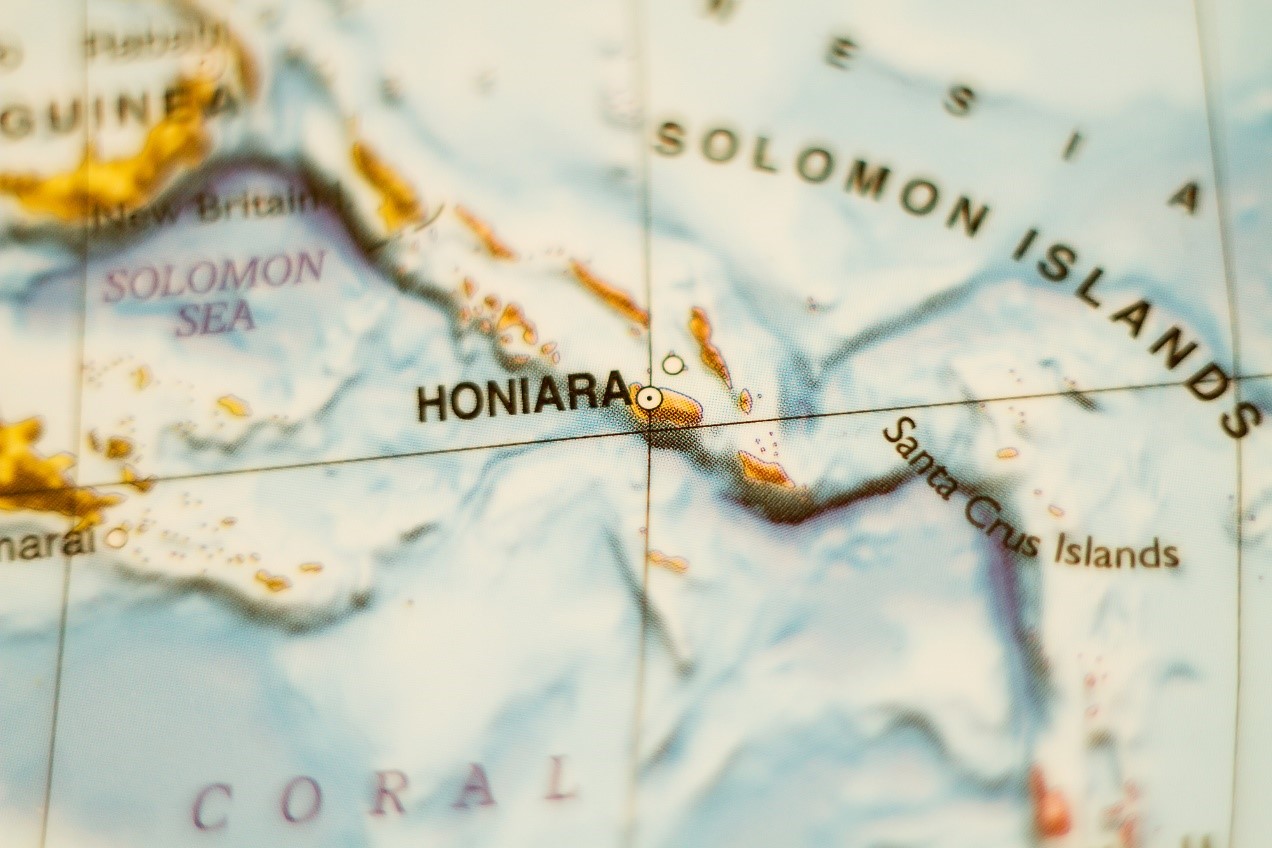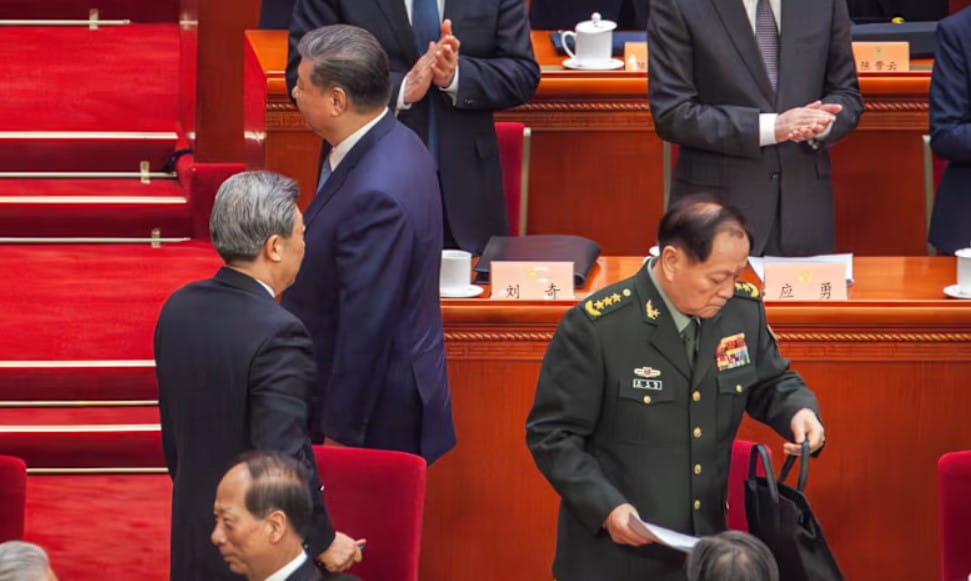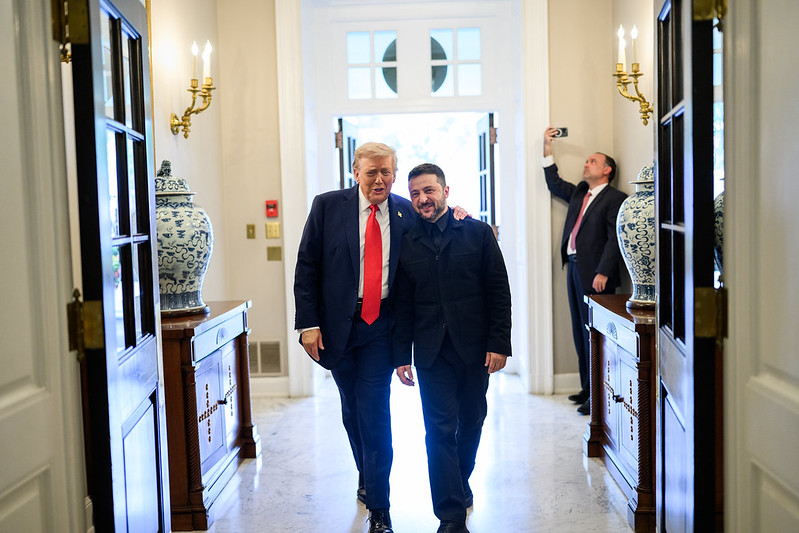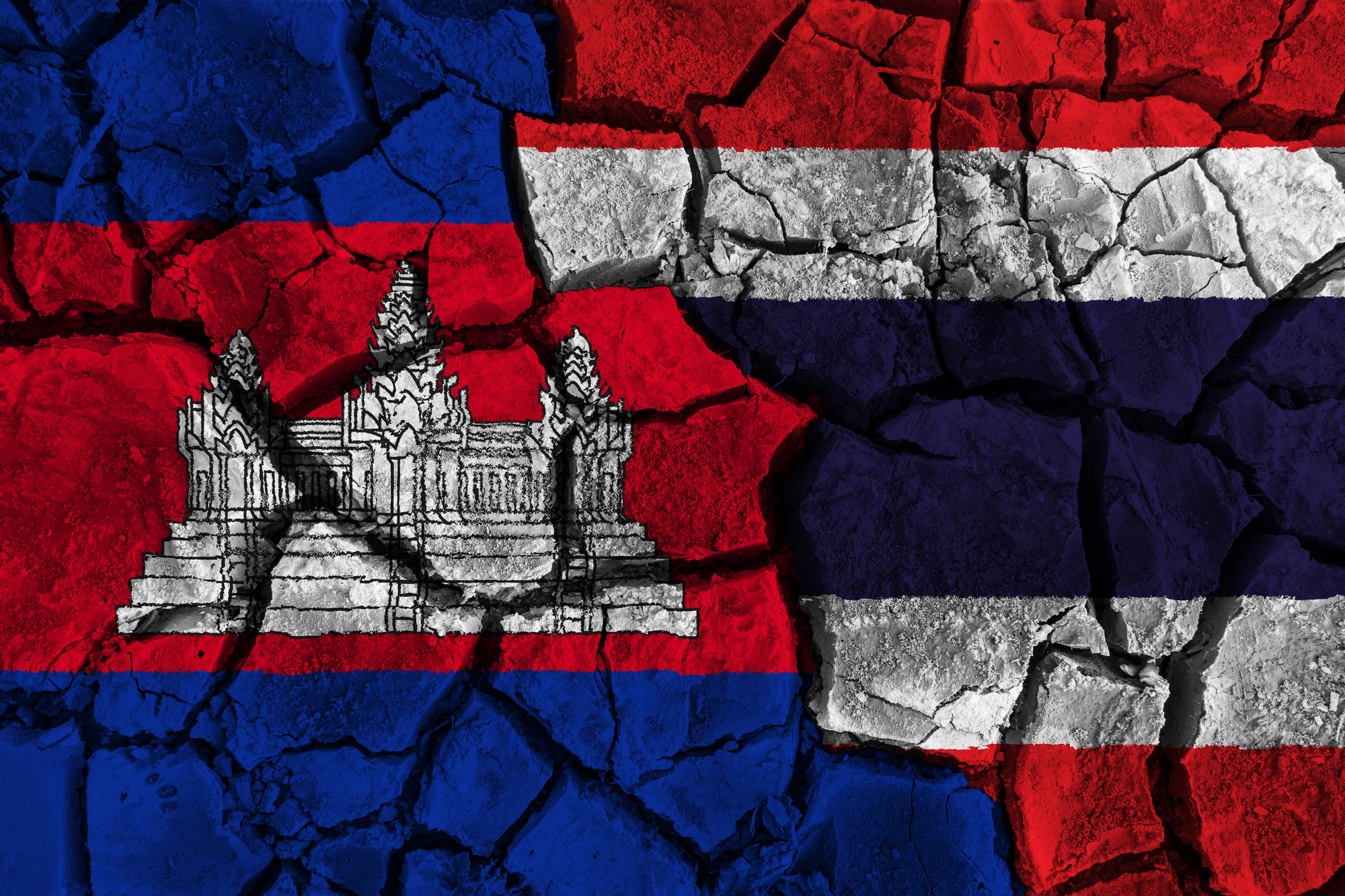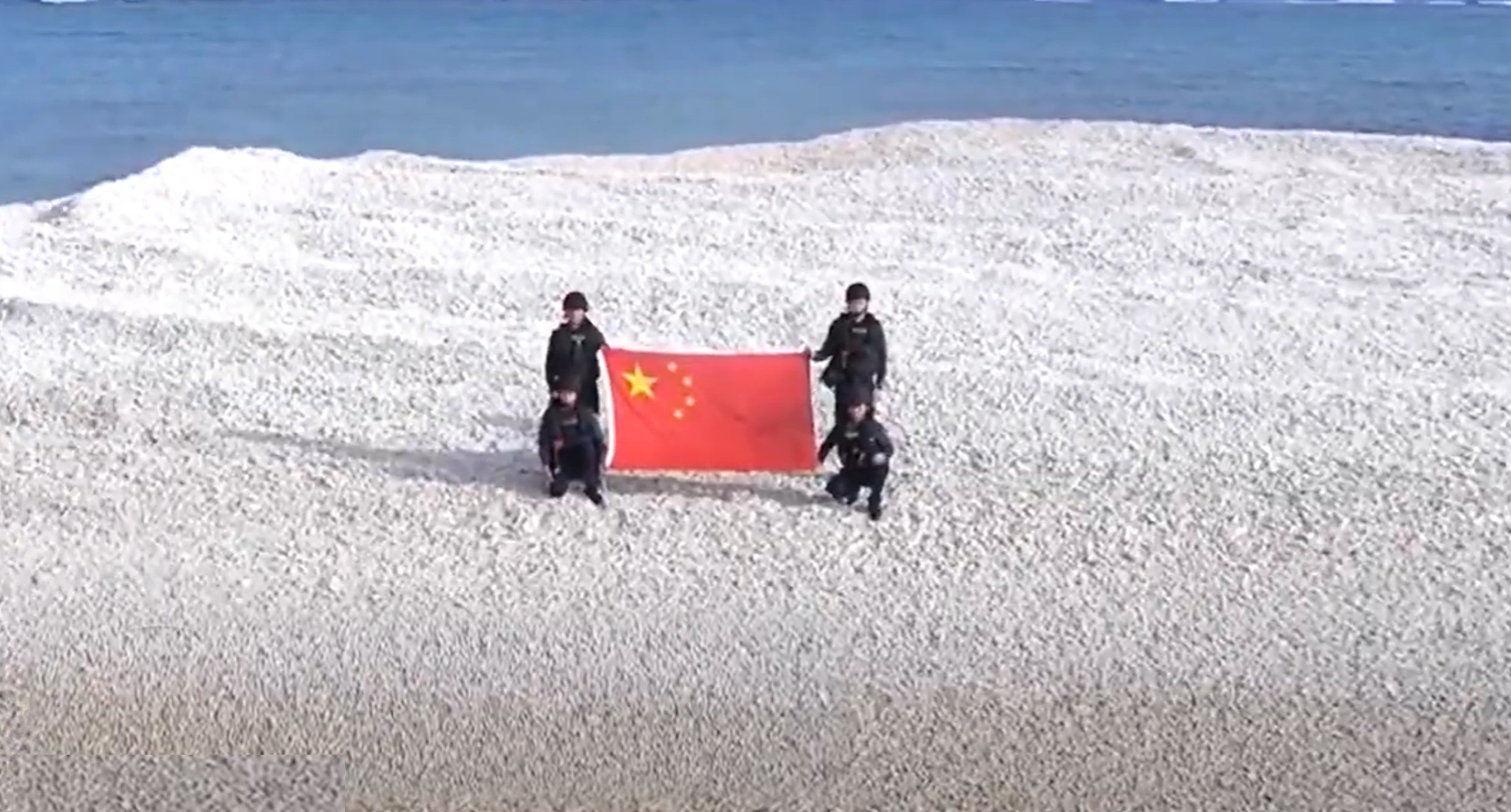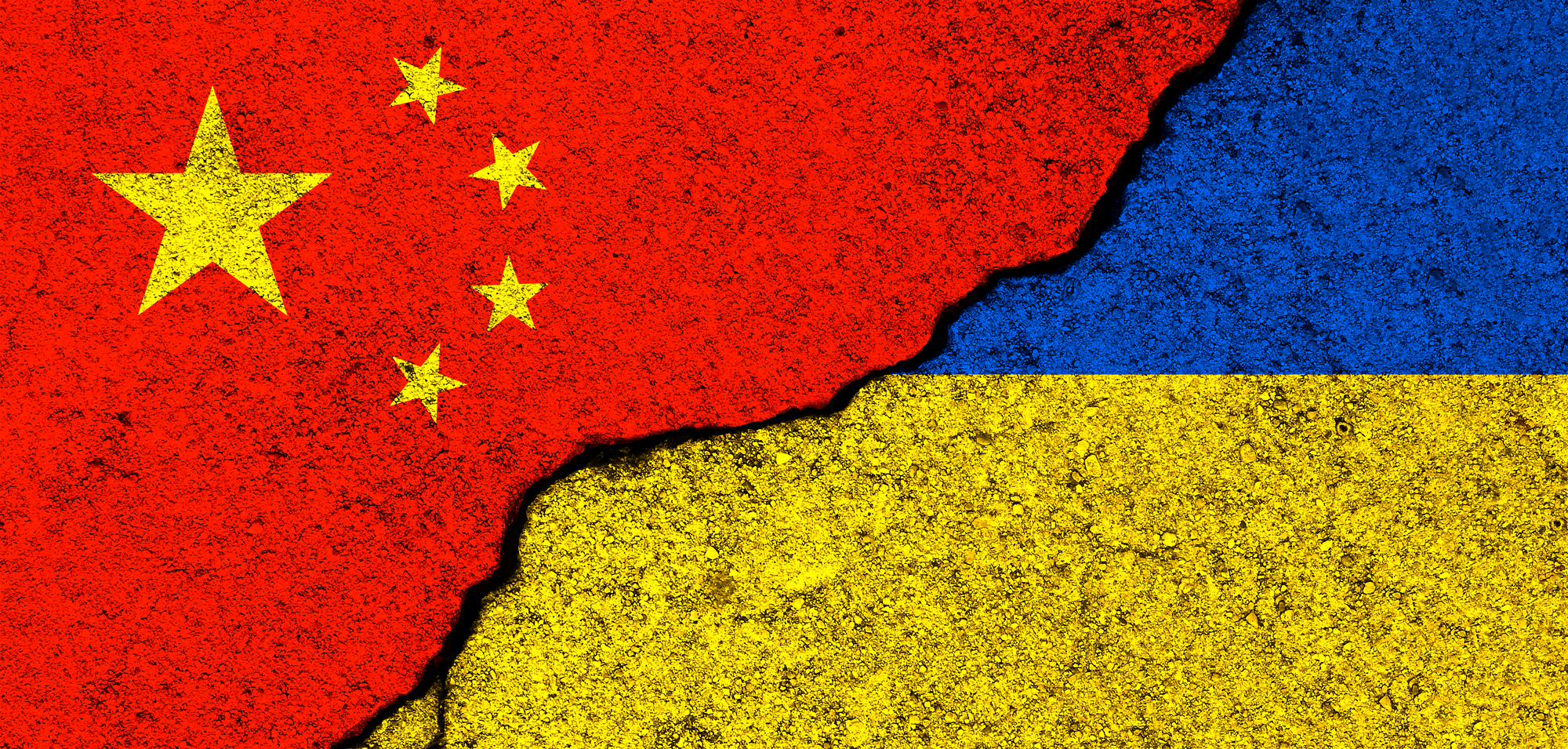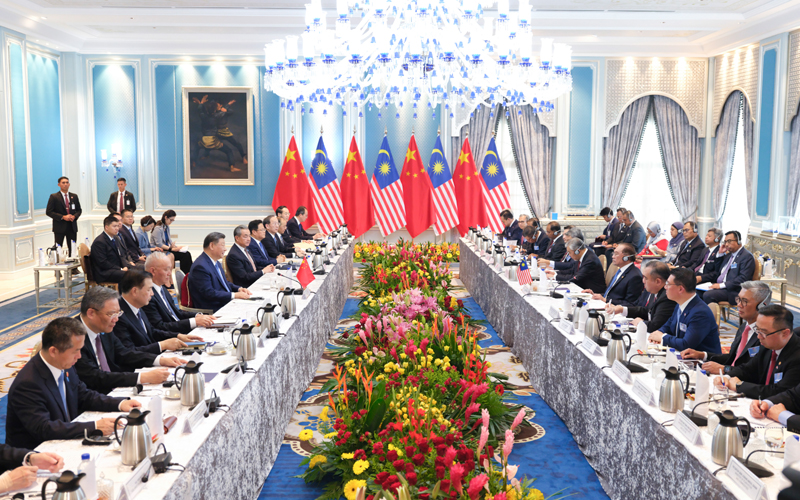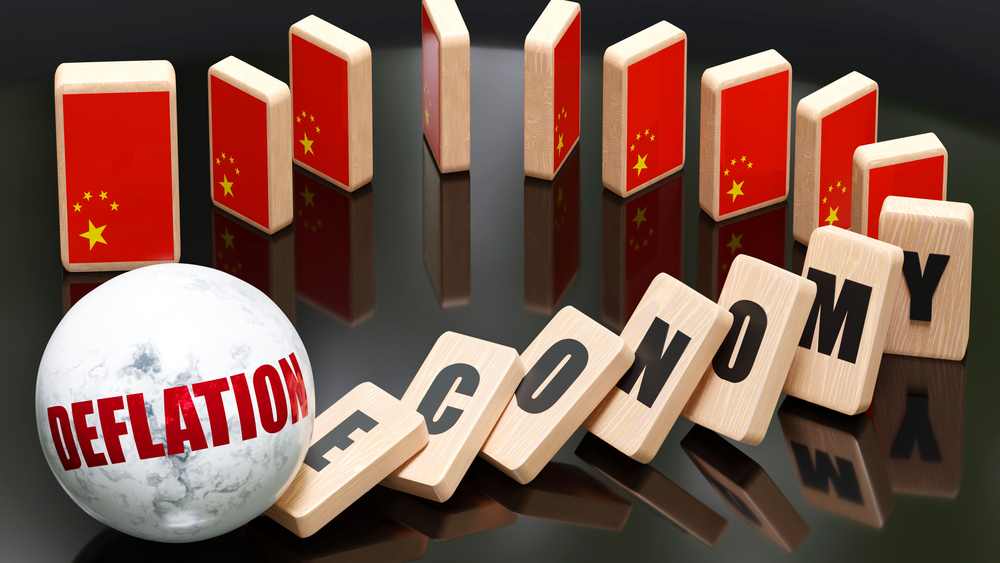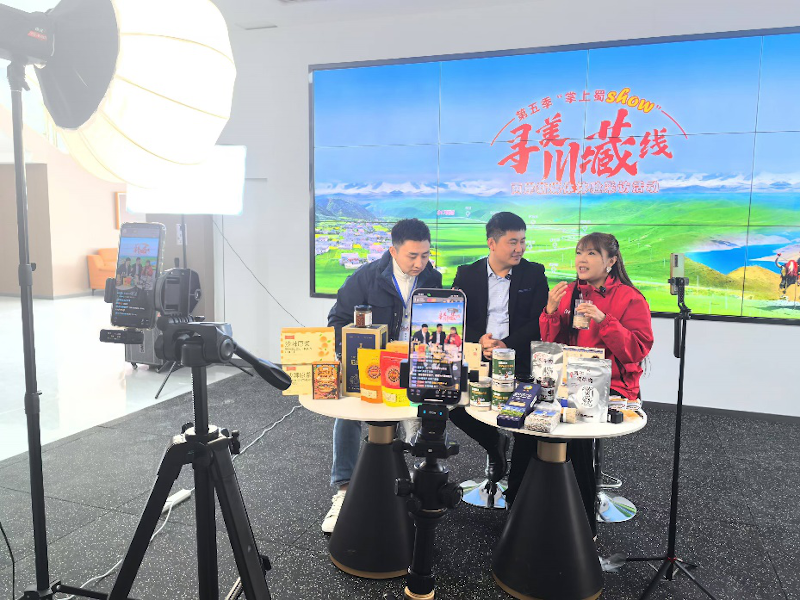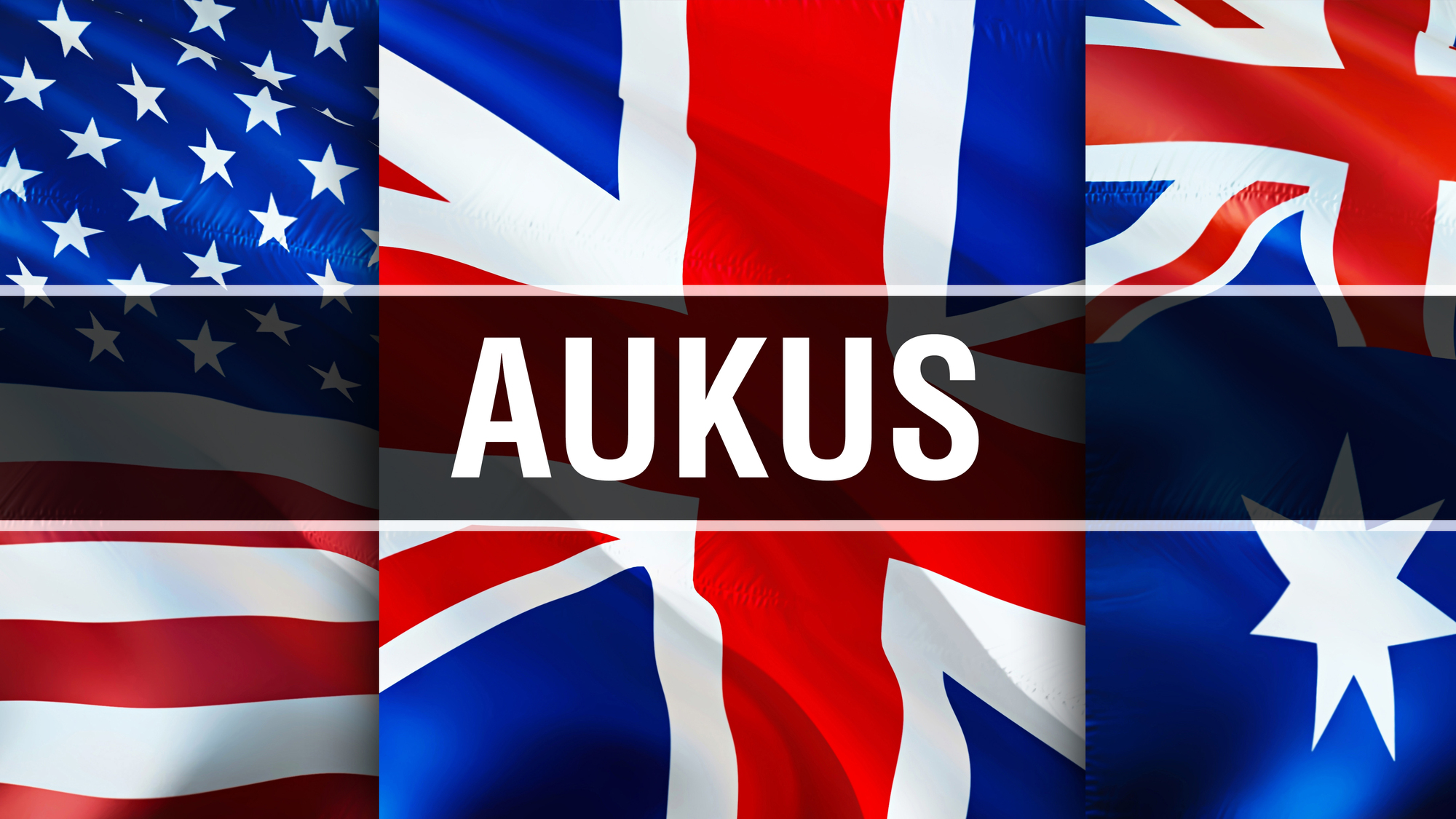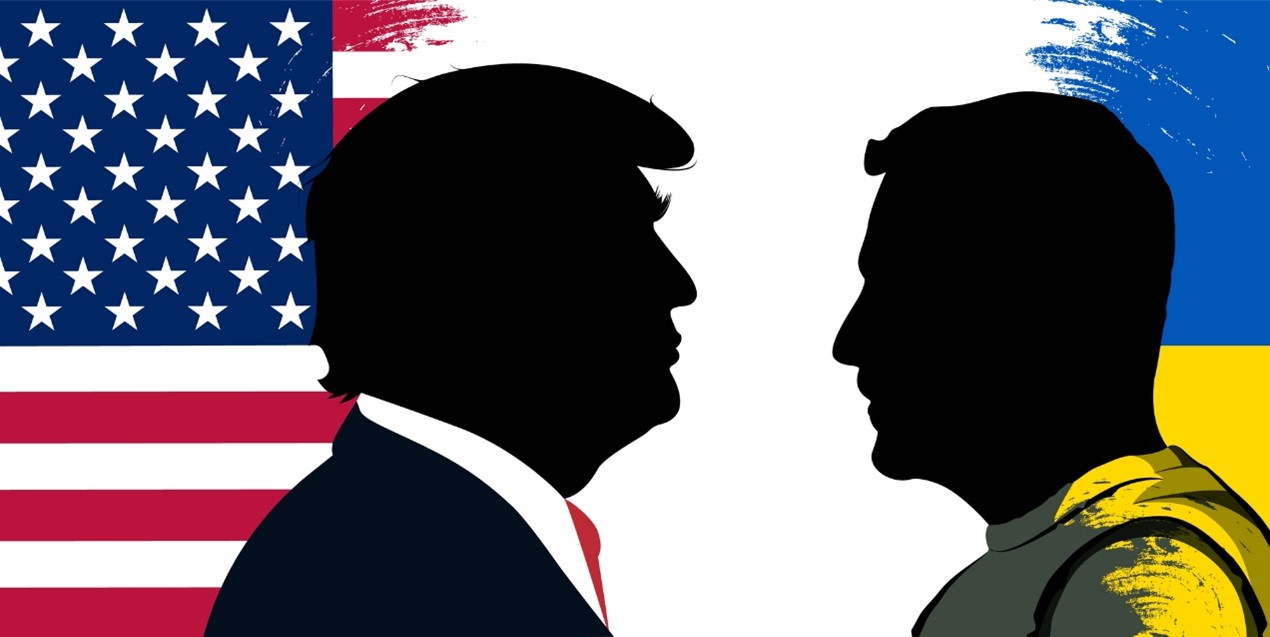The BRI has been the ambitious foreign policy strategy of China to bring the developing countries under its realm of influence as shown in the “cautionary tale” of Sri Lanka. Picture source: Ministry of Foreign Affairs, PRC, January 10, 2021, Ministry of Foreign Affairs, the PRC, https://www.mfa.gov.cn/web/ziliao_674904/zt_674979/dnzt_674981/qtzt/kjgzbdfyyq_699171/202201/t20220110_10480484.shtml.
Destiny of the Crown Jewel:
Will Sri Lanka Become a Chinese Colony?
By Patrick Mendis
After winning the nearly 30-year civil war in Sri Lanka, Gotabaya Rajapaksa—the then secretary of the Ministry of Defense and Urban Development—said at the third Galle Dialogue on Maritime Security in December 2012 that Hambantota Port is not part of the Chinese “String of Pearls” strategy to encircle India or to keep the U.S. away from the Indian Ocean. Nonetheless, Rajapaksa then clarified that “the Chinese investment in Hambantota Port is a purely economic one.” In fact, Sri Lanka is the “crown jewel” of China’s multibillion dollar Belt and Road Initiative (BRI) across the Indian Ocean, which connects the Hambantota Port, the Colombo Port City (CPC), the Colombo Lotus Tower, and many other massive development projects.
For the last phase of the civil war that ended in 2009, China provided the needed “economic support, military equipment, and political cover at the United Nations to block potential sanctions.” The war was mainly a clash between “the Sinhalese-dominated Sri Lankan government and the Liberation Tigers of Tamil Eelam (LTTE) insurgent group,” which “hoped to establish a separate state for the Tamil minority.” During these years of bloodshed and human rights violations on both the government and LTTE sides, Sri Lanka had always been afraid of the powerful lobbying efforts by the Tamil diaspora in the West for encouraging their governments to support for UN sanctions. The Colombo administration had equally been distressed by another “direct Indian intervention”—with the mounting pressure from its Tamil Nadu—in Sri Lanka’s internal affairs.
With this backdrop, paying tribute to the Chinese patronage at the third Galle Dialogue, Defense Secretary Rajapaksa reaffirmed that “China was an obvious nation to approach” among other traditional donor nations such as Japan, India, South Korea, and the U.S. Victorious as war heroes during the decade of 2005-2015, his elder brother Mahinda—the then president of Sri Lanka—and his three brothers controlled “many government ministries and around 80 percent of total government spending.” These strongmen also “negotiated directly” with China while considering the island nation as an extended family enterprise.
Twelve years later, Gotabaya Rajapaksa—now the president of Sri Lanka since November 2019 with his family members still in parliament—has brought the so-called “perfect tropical paradise” into an unprecedented socio-economic turmoil with the mismanagement of economic policy and massive corruption by successive governments. Once the leading nation in the UN Human Development Index of life expectancy, literacy rate, and GNP per capita in South Asia, the “paradise” is now entangled with an enormous “debt trap” with China, Japan, and international financial institutions as well as a wide range of Chinese “white elephant” projects, including the US$104 million Colombo Lotus Tower for Beijing’s “espionage” operation in South Asia and the US$209 million Mattala Rajapaksa International Airport—the “emptiest” international airport in the world
The Peaceful ‘Aragalaya’
Earlier this year, the autocratizing Rajapaksa regime has made Sri Lanka completely bankrupt and the country has defaulted on “the entirety of its foreign debt amounting to about US$51 billion.” It caused a food shortage with no gas for cooking, long lines of petrol for vehicles, and no access to medicines. The economic collapse has developed into organic protests (“aragalaya” or struggle) in Colombo and elsewhere in the country. Violence erupted when the Rajapaksa allies attacked the peaceful protesters who demanded the embattled President Gotabaya’s resignation, chanting “Gota Go home” for several months. His elder brother Mahinda—the prime minister who had previously been the president—was forced out from power in May and his other brother Basil—the finance minister—resigned from the cabinet in June 2022.
The removal of the pro-Chinese Rajapaksa family presents a paradox for China—especially when President Gotabaya appointed five-time Prime Minister Ranil Wickremasinghe back to the post, replacing the president’s brother Mahinda. The unpopular but veteran prime minister and his United National Party has only one seat out of 225 in the parliament. However, pro-American Wickremesinghe is seen as a strange bedfellow for political expediency and a crisis manager for Gotabaya, who wants to remain in the powerful presidency.
The new prime minister promised the nation that he would resolve the current shortage of oil, gas, electricity, medicine, and other subsistence imports for daily survival. Wickremesinghe also assured to negotiate with the International Monetary Fund (IMF), the World Bank, and other lenders. It is a matter of concern for China because the transparency required by these institutions would expose the nature of Chinese loans and bribe schemes, the exorbitant interest rates and kickbacks, and secret negotiations conducted by the members of the Rajapaksa family and associates.
The Chinese Paradox and Autocratic Regimes
In January 2022, Chinese State Councilor and Foreign Minister Wang Yi arrived in Sri Lanka at the request of the Rajapaksa government to restructure debt payments and to alleviate the financial troubles and economic hardships of the island since the start of the Covid-19 pandemic. During his visit, the Chinese Foreign Ministry in Beijing announced that Western media were “unfairly hyping debt issue,” adding that “calling the cooperation projects between China and Sri Lanka ‘white elephants’ is completely untrue” as “bilateral cooperation is welcomed by local people.”
It is true that debt owed to China now accounts for only 10 percent of Sri Lanka’s total US$35 billion foreign debt. Sri Lanka’s debt to Japan also accounts for about 10 percent of total debt; China is the fourth-largest lender followed by the international financial markets, the Asian Development Bank, and Japan. Unlike the other lenders, however, China’s motivation is driven by its communist statecraft and geopolitical calculus in the Indian Ocean region. When Sri Lanka failed to repay Chinese debt resulted from the Hambantota Port, for example, the Colombo government agreed to a debt-for-equity swap and gave Beijing a 99-year lease of the facility along with the 15,000 acres of land covering a wildlife sanctuary.
Moreover, the nearby Mattala Rajapaksa International Airport was built with the possible intention of a dual civil-and-military installation in future use. With China’s first military base at Djibouti in the Horn of Africa and the latest Ream naval base in Cambodia, Beijing may target the world’s emptiest international airport in Sri Lanka to develop its emerging Indian Ocean military theater against the U.S., its allies, and India. All these projects were initially promoted within BRI as development assistance. In fact, the BRI has been the ambitious foreign policy strategy of China to bring the developing countries under its realm of influence as shown in the “cautionary tale” of Sri Lanka.
When Foreign Minister Wang and President Rajapaksa met in Colombo to discuss Sri Lanka’s financial and economic crisis, the state-run Global Times in Beijing portrayed the Chinese capital as a gateway to growth. Moreover, it claimed that a Sino-Lanka “free trade agreement” would benefit from “the opportunities of the Regional Comprehensive Economic Partnership (RCEP) agreement and China’s vast market.” With the China-centric mindset, Wang further reiterated that the Colombo Port City (CPC) and Hambantota Port projects “could be engines for pushing forward bilateral cooperation.” China ambitiously financed the US$1.4 billion CPC—an artificial land of 269 hectares reclaimed from the sea—and marketed it as an international business center that would compete with Dubai, Hong Kong, and Singapore. The Chinese company owns about “43 percent of the land on a 99-year lease” in the artificial port city.
Additionally, with its newly created CPC Commission within the CPC Economic Commission Bill passed by the parliament, the Chinese presence is “completely unaccountable to the Sri Lankan parliament or its committees.” The CPC Commission is accountable only to the president and its membership is “open to non-citizens of Sri Lanka.” In a May 2021 report, the Center for Policy Alternatives, a think-tank in Colombo, concluded that the CPC “could be inimical to the sovereignty of the people exercised through the executive, legislature and judiciary in terms of the Constitution and the Constitutional supremacy.” For the first time in history, Beijing now owns a 17-kilometer four-lane highway in Colombo to recover the principal and earn profit for the next 18 years. The Chinese influence expanding from ports to inland projects has ignited public “fears that the island nation may soon become a Chinese colony.”
Unfortunately, neither Wang nor Rajapaksa has foreseen the increasing danger to the sovereignty of Sri Lanka and the rapidly changing antagonistic sentiments against the Rajapaksa family as demonstrated by the “Aragalaya” people in the public square. Furthermore, the shifting opinions of China among the powerful Sinhala Buddhist nationalists have become more vocal as the increasing number of Buddhist monks joined the Aragalaya. Thus, will Sri Lanka become a Chinese “enclave” or Beijing’s “tributary” state with the enrichment of the Rajapaksa family and associates?
Sri Lanka Has Awakened
With the growing casualties of his autocratic regime and political maneuverings, President Gotabaya appears to see himself as a political survivor who has no choice but to remain in presidency at the expense of human suffering, undermining national sovereignty and trading it away to China.
In an unlikely bombshell, President’s Counsel Wijeyadasa Rajapakshe—currently Gotabaya’s Minister of Justice, Prison Affairs, and Constitutional Reforms—wrote an open 45-point letter to President Xi Jinping in January 2022, effectively accusing China of deception. In his letter, the president’s counsel accused China of an ambition to become “the world power” at the expense of “innocent people.” The message underscores that national sovereignty is more than a geopolitical matter but rather a psychological and historical concern for the Sinhala Buddhist nationalists and Aragalaya protesters.
Pointing to friendly Sino–Sri Lanka relations that traced back millennia as well as the two-year residency of the famous Chinese Buddhist monk Faxian (410-11 AD) who lived in the ancient capital of Anuradhapura, Minister Rajapakshe incriminated President Xi that “the longstanding relations turned into a difference course” since Beijing launched the BRI on the “pretext of strengthening the foreign policy and economic strategy of China.” The minister added that China is “dismantling the peace” in the region as well as in the world by making Sri Lanka “the first victim” of its “power struggle with other nations.” Then, he explained that China aimed to make Sri Lanka “bankrupt in the sphere of economy” and dismantle its relations with “all the friendly countries,” which were supporting it enormously throughout the history, i.e., Australia, India, Japan, South Korea, the U.S., and European countries including the United Kingdom. Furthermore, the president’s counsel complained that China sold its Sinopharm vaccine at US$15 per dose to Sri Lanka while selling it to other nations at US$10 or below during the Covid-19 pandemic.
President’s Counsel Rajapakshe also criticized former president Mahinda as “shameless” and characterized President Gotabaya as “corrupt” in his letter to Xi. Without a doubt, Rajapakshe’s political courage may have played a subtle but critical impetus in the national consciousness of the times that try the island’s soul. Gotabaya has apparently been unmoved by the accusations by the president’s counsel—and now his cabinet minister of justice. While condemning China for purposefully pushing Sri Lanka into a “debt trap,” Rajapakshe warned Xi that the people of Sri Lanka would determine the next leaders at the presidential and parliamentary elections; hence, they will restructure or annul agreements made with China under the Rajapaksa governments that have proven to undermine national sovereignty.
Sri Lanka Caught in the Sino-American Rivalry
In his letter, Rajapakshe informed Xi that the U.S. and the European Union granted Sri Lanka the Generalized Scheme of Preferences (GSP) by removing import duties from products coming into their markets over the last few decades. On the other hand, the president’s counsel argued that while the Chinese “mission of aggressive invasion to dominate both economic and geopolitical environments” involves “corrupt and dubious transactions” in unprofitable white elephant projects, the newly elected President Gotabaya Rajapaksa also “succumbed” to Xi’s pressure, as China was able to control the Colombo Port City.
In his analysis of the prevailing geostrategic Sino-American competition in the Indo-Pacific region, Rajapakshe elaborated that the U.S. “demanded” the Colombo government should “enter into MCC and SOFA agreements” with Washington. The Millennium Challenge Corporation (MCC) compact is designed to reduce poverty through economic growth while the Status of Forces Agreement (SOFA) allows the U.S. military to station forces in Sri Lanka. Moreover, the president’s counsel indicated to Xi that India also “demanded” the Colombo East Port Terminal and the Oil Tank Farm in the strategic natural harbor of Trincomalee be given to New Delhi. Hence, President Gotabaya’s counsel asked Xi’s empathy when he wrote: “as a small nation [we] will become a victim as the powerful nations . . . would retaliate us demanding accommodation for themselves to establish their domination in certain places of the island.”
In the midst of the biggest socio-economic upheaval in Sri Lanka since independence in 1948, the president’s counsel has maintained that the Chinese “interference and influence” in geopolitical and economic “invasions” put Sri Lanka in a “severe predicament;” as a consequence, the island nation “had never experienced such devastations even during the last century.” However, the state-sponsored Global Times in Beijing described the prevailing situation through a different lens: “The rich cultural activities organized by Chinese enterprises in Colombo Port City has made Colombo Lotus Tower a new local landmark, and the Hambantota Port project helped drive the local land price.” Moreover, the newspaper continued that “the popularity of Chinese vaccines among local people was one proof of their trust in Chinese products.” It is quite revealing to note that China has one and only mantra-like “truth” when Sri Lanka offers opposing views on its power as the president’s counsel demonstrated openly.
Beijing’s “unity” of all Chinese opinions is illustrated by the singularity of messaging by the Global Times as its “observers believe China would offer a helping hand to Sri Lanka to deal with its financial crisis through friendly negotiations.” For a large number of Sri Lankans, the phrase “friendly negotiations” is Chinese euphemism for “corrupt and dubious transactions” behind closed doors. As stressed by the Donald Trump and Joe Biden administrations, China has been using loans to entice borrowing nations into a “debt trap” that provides Beijing influence over strategic assets and natural resources when those governments could hardly repay.
Will History Mirror Future?
In his congratulatory “birthday letter” to President Gotabaya in June 2022, President Xi assured that “China always stands ready to extend its support to Sri Lanka” and concluded: “I attach great importance to the development of our relations and would continue work to elevate it to new heights.” In the midst of open criticism, it is possible that Xi may recalibrate his BRI strategy and foreign policy agenda in Beijing’s “crown jewel” to preserve and continue historical goodwill and mutual friendship.
Moreover, the Global Times claimed that “China has been easing many developing countries’ debt burden and has the highest deferral amount among G-20 members.” As one of the single largest creditors to Africa, China is widely credited with “debt forgiveness” to many low-income countries in the African continent and elsewhere.
Before the pandemic, Beijing negotiated “debt relief” bilaterally without consulting the IMF, the World Bank, or other lenders. However, China has now worked with the G-20 and established the terms of debt relief within G20’s Common Framework to coordinate and negotiate jointly on official bilateral lending. Nevertheless, many debt-burdened nations have experienced faster debt relief service from China than the West.
Indeed, China only accounts for 10 percent of Sri Lanka’s foreign debt. It is then morally imperative for other lenders—like the Asian Development Bank, the IMF, India, Japan, and most importantly the U.S.—to jointly help the paradise-island nation.
(Dr. Patrick Mendis is a distinguished visiting professor of transatlantic relations at the University of Warsaw in Poland as well as a distinguished visiting professor of global affairs at the National Chengchi University in Taipei. A non-resident senior fellow of the Synergia Foundation in India and the Taiwan Center for Security Studies)
The views expressed in this analysis do not represent the official positions of his current or past affiliations nor governments.

